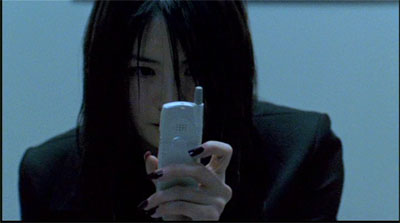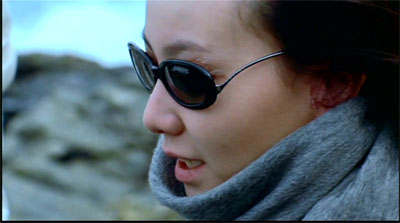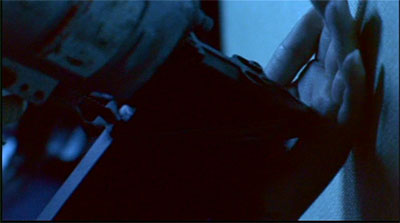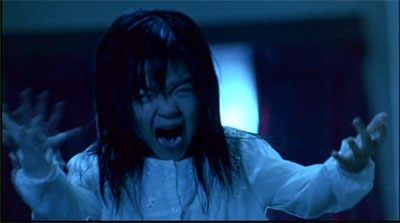
 BUY IT AT AMAZON: CLICK HERE!
BUY IT AT AMAZON: CLICK HERE!
STUDIO: Tartan Video
MSRP: $24.99
RATED: R
RUNNING TIME: 100 Minutes
SPECIAL FEATURES:
• Audio commentary on selected scenes
• Behind the scenes featurette
• Deleted scenes
• Epilogue featurette
• Interviews with the cast and crew
• Making of featurette
• Tartan Asia Extreme trailers
• TV spots and trailers
The Pitch
“Ringu made a lot of money and scared people. Wouldn’t it be great if we could duplicate that success with minimal effort? How about this – instead of being in a videotape, the ghost is in a cell phone! Let’s get ready to rake in the dough!”
The Humans
Ji-won Ha, Yu-mi Kim, Woo-jai Choi, Ji-yeon Choi and Seo-woo Eun
The Nutshell
The medium of ghost travel in Ringu was a bootleg VHS tape. Sure, it’s kind of scary to know that you could potentially end up with a killer tape the next time you buy a box full of VHS tapes from the creepy booth owner at the horror convention, but how terrifying can a ghost contained in an obsolete medium really be? Shouldn’t ghosts be moving up to DVDs or TIVOs by now?
Byeong-ki Ahn thinks so. Inspired by watching Ringu, Ahn crafted the tale of a similar ghost who haunts through the medium of cellular phones. What better way for a ghost to haunt people? Practically everyone has a cell phone these days. Plus, new features keep getting added to phone service. Not only could a ghost haunt anyone in the world, but it could download the newest zany Jamster ringtone and play a rousing game of video poker. It beats being zapped by proton packs or talking to little girls through TV screens.

Just text this number and I can receive three hip ringtones for only five bucks a month? Sign me up!
The Lowdown
Ji-won
is an investigative reporter who has just wrapped up a series of
articles exposing a sex ring operation. Several powerful men were
implicated in the articles, making Ji-won a lot of enemies. Ji-won has
decided to turn down the heat on the situation by going under the radar
for a while, working on fluff pieces about paranormal activity.
Unfortunately for her, one of her enemies has tracked her down and
begins calling her cell phone and threatening her. Ji-won decides to
change cell phone numbers and as luck would have it ends up getting a
haunted number.
Everyone who has had this particular cell phone
number has met with a grisly death. The first schoolgirl to have the
number mysteriously disappeared. One of the men with the number died in
a car accident, and one girl was permanently blinded. So not only does
Ji-won have to deal with threatening messages from an angry stalker,
but she has to deal with ghosts using up her cell minutes with their
ghastly moans.

You should have known better than to go on a date with Mr. Blonde.
Being
trapped in a phone must not be that fun for a ghost, because the spirit
is eager to escape into the real world. Yeong-ju, the daughter of
Ji-won’s friend, answers the cell phone and gets an earful of haunting.
Now Yeong-ju is starting to act very peculiar, leading Ji-won to
believe that she has been possessed by the cell phone spirit. Perhaps
the constant humming of the crazy frog ringtone tipped her off.
Phone borrows a lot from Ringu,
too much in fact, but at least Ahn is honest about it. Even minor
details that could have been easily changed are copied, such as the
protagonist being a journalist. The only real difference between the
premises is that in Phone,
you don’t get a phone call and then get seven days before you die – you
just get a phone call and die right afterwards. This ghost doesn’t have
time to wait around.
The film contains its fair share of
Japanese horror clichés. A blue tint covers everything when the movie
is trying to be scary and random freaky children jump out and say boo
over and over. The scares don’t rely on setting up any type of mood or
sense of foreboding. The scares in this film are essentially the same
as a guy jumping out from around a corner and screaming at you. This
might work if you’ve never seen a Japanese horror film before or if you
have a heart condition.

On our next episode, Bob Vila will show you the proper way to hang a corpse up in your living room. It makes a great conversation piece!
Since it makes no effort to be original, Phone
at least makes an attempt to do things better than the myriad of horror
films identical to it. The weak link of many Japanese horror films, the
annoying child, is not so annoying in Phone.
Seo-woo Eun does a great job playing a child possessed by the soul of a
vengeful spirit, a role that requires her to do some odd things. She
even has to play an angry lover and delivery some Dynasty-esque bitch slaps.
Whenever
a particular horror film tries something new and succeeds, a million
imitators come out of the woodwork. After the success of Scream,
you couldn’t spit without hitting a crappy self-referential horror
film. The horror industry seems to be composed of 10% innovation and
90% speedy imitation. The Japanese horror industry is no different.
Despite ripping off Ringu and Ju-on well, Phone is still another bland retread of the same concepts. If you’ve seen The Ring, you’ve seen Phone.

Be forewarned: she may be small, but no man can match her power once she "hulks up."
The Package
Phone is presented in anamorphic widescreen with DTS digital surround 5.1, Dolby Digital 5.1 surround and Dolby Digital 2.0 stereo tracks available. The disc includes English and Spanish subtitles.
It’s usually humorous to see a company list “scene selection” as a special feature on a DVD package. This is because scene selections are so expected of a DVD release that it doesn’t even qualify as a feature. This makes it all the more surprising that Phone’s scene selection page is quite possibly the most useless in DVD history. There are no chapter titles or still frames from the film to indicate what happens in a given chapter – just a static picture of a cell phone and nine numbers to choose from. To make it even more bizarrely humorous, a chapter insert is included with the DVD. What’s on the insert? Why, it’s a screenshot of the exact same scene selection page from the DVD.
The disc’s actual features are handled in better manner. Interviews with the director and cast are included and range from interesting to completely worthless. Ahn talks about his past projects, the influence Ringu had on Phone and the type of films he wants to make in the future. Sadly, the concept of a film centering on a haunted copy of Haunted House for Atari 2600 isn’t mentioned. A man can still dream.

Your movie isn’t THAT bad. Don’t be so down on yourself!
In lieu of creating a documentary style featurette focusing on the behind the scenes action, Tartan has included a wealth of raw on the set footage. If you wish, you can watch over an hour of shots being set-up, rehearsals and takes upon takes from the beginning of the movie until wrap. If you’ve every wanted to experience all the monotony that comes from filming a mediocre horror film in your very own home, this is the feature for you.
Other features include deleted scenes, TV spots and trailers for other Tartan Asia Extreme releases. Both of the deleted scenes focus on a very minor subplot that was excised from the film. There is also an option to view these scenes with director commentary. Trailers for Oldboy, Doppelganger and A Tale of Two Sisters are featured on this disc. Three good films that represent the Asia Extreme label well.